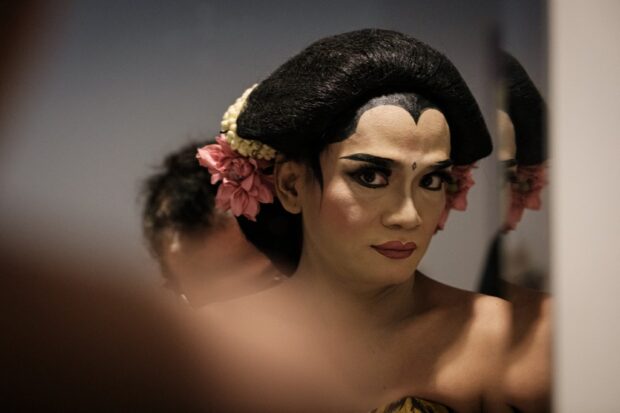This photo, taken on Aug. 19, 2023, captures Rianto, a renowned choreographer and dancer of Lengger Lanang, an Indonesian cross-dressing folk art. Rianto is seen preparing for a performance in Jakarta at the Rumah Lengger community dance center, which he established. Lengger Lanang is an ancient dance tradition that originated from 16th-century fertility and harvest rituals in Central Java province. Historically, it was a revered form of folk art, where performers were admired for their ability to embody both genders. However, the dance is now facing challenges as prejudice against queer-related art grows.
In the capital, Jakarta, Rianto captivates a crowd of thousands with his graceful movements, adorned in full makeup and an orange sash, as he performs the centuries-old Lengger Lanang dance. This traditional art form pushes the boundaries of masculinity in a society deeply rooted in conservatism and religion. The dancers, dressed as Javanese princesses, wear tight, colorful batik dresses and ornate fake hair bun updos. Despite its rich history, Lengger Lanang is at risk of vanishing, with less than 100 performers daring to participate in shows.
Rianto, a 42-year-old dancer and choreographer, expressed the challenges faced by Lengger Lanang dancers. He shared, “Lengger is still looked down on and negatively stigmatized. People still see men dancing as going against the norm.” Nevertheless, the performers continue to sway their hips, flick their fingers, and throw seductive glances at the audience in a Jakarta theater, accompanied by lively Javanese beats and melodies. They use their deep baritone voices to crack jokes, reinforcing the fact that, despite their attire, they are male. Rianto, who is married to a Japanese woman, explained, “Lengger Lanang is where masculine and feminine meet inside one body and it is aimed to create peace within oneself.”
Once considered a sacred tradition, Lengger Lanang has now become a target of prejudice. In 2018, a movie loosely based on Rianto’s life story received critical acclaim but faced bans in several Indonesian cities due to accusations of promoting homosexuality. The town of Banyumas, the birthplace of Lengger Lanang, hosts an art festival in September, where the tradition is openly celebrated. According to Lynda Susana Ayu Fatmawati, a cultural researcher at Jenderal Soedirman University, Lengger Lanang was initially a post-harvest ritual to express gratitude to the goddess of fertility. It later evolved into a form of entertainment and a welcoming gesture for esteemed guests.
Becoming a Lengger Lanang dancer entails undergoing cleansing rituals such as fasting, bathing in springs, and meditation. Prior to each performance, the dancers light incense and offer flower petals and coconuts to God. However, conservative Muslims argue that men should not dress or act like women, citing Islamic teachings. Taefur Arofat, chairman of Banyumas Ulema Council, the town’s top Islamic body, stated, “In Islam, it’s clear that a man should not dress or act like a woman, and vice versa. It was condemned by the prophet.”
Living as Lengger Lanang dancers presents daily challenges for Rianto and his colleagues. “Being a male dancer is very difficult. The stigma from the public is very negative because dancing is associated with femininity,” Rianto shared. Torra Buana, another dancer, revealed that he had to keep his dancing a secret due to negative perceptions. However, not everyone opposes this art form. Spectator Hendro Utomo said after a Jakarta show, “It’s art and we need to prevent it from disappearing.”
To ensure the preservation of this fading tradition, Rianto established Rumah Lengger, a center where young dancers can practice and learn about the art’s philosophy. Among these aspiring dancers is Ayi Nur Ringgo, who discovered a passion for Lengger Lanang through university videos. Despite facing negative comments from classmates, Ayi has embraced his strength and made peace with himself. He stated confidently, “I no longer care.” Guided by Rianto’s mentorship, Ayi and his fellow dancers are determined to continue and regenerate this culturally significant tradition. Rianto expressed his desire to safeguard the legacy of Lengger Lanang, emphasizing, “Don’t let this fade away.”
Denial of responsibility! Vigour Times is an automatic aggregator of Global media. In each content, the hyperlink to the primary source is specified. All trademarks belong to their rightful owners, and all materials to their authors. For any complaint, please reach us at – [email protected]. We will take necessary action within 24 hours.


